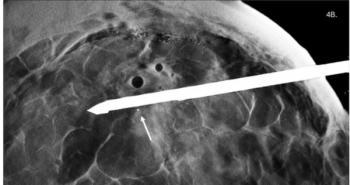
Early Radiation May Up Breast Cancer Risk in Some Women
Women with mutations to the BRCA1/2 genes who undergo diagnostic chest radiation before age 30 are at a higher risk of developing breast cancer.
Women with mutations to the BRCA1/2 genes who undergo diagnostic chest radiation before age 30 are at a higher risk of developing breast cancer than are women with the mutation who are not exposed to the same levels of radiation, say researchers in a study published on
It is known that women with the BRCA1/2 gene mutations are already at higher risk of developing breast cancer than are other women, but researchers from the Netherlands Cancer Institute looked at 1,993 women with either gene to see if exposure to radiation before the age of 30 years would alter that risk even further.
The researchers asked the women about their exposure by either X-ray or mammogram, how old they were at the time of the first exposure, how many times they had undergone chest X-rays or mammograms before age 20 and then again during the periods of between age 20 to 29 and 30 to 39. They were also asked the date of their last exposure. Of the 1,993 women, 848, or 43 percent, were diagnosed with breast cancer.
Nine-hundred twenty-six women, or 48 percent, had reported ever having an X-ray and 33 percent reported having a mammogram. The average age of the first mammogram was 29. The researchers found that a history of exposure, either chest X-ray or mammogram, before the age of 20 increased the risk of breast cancer by 62 percent. Exposure between ages 20 and 29, increased the risk by 43 percent. However, there did not appear to be an increased risk for women who had X-rays or mammograms between the ages of 30 and 39.
“Exposure to diagnostic radiation before age 30 was associated with an increased breast risk in BRCA1/2 mutation carriers,” the authors wrote. However, they noted that more research needs to be done with larger groups of women because differences were noted between the two mutations that need to be further explored. They recommended non-ionizing radiation imaging techniques, such as MRI, for women at higher risk of breast cancer.
Newsletter
Stay at the forefront of radiology with the Diagnostic Imaging newsletter, delivering the latest news, clinical insights, and imaging advancements for today’s radiologists.














